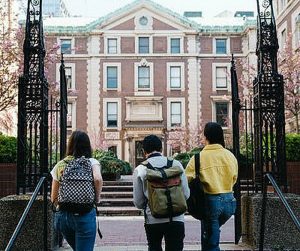Advantages And Disadvantages Of Studying in a Private University: Most secondary school students want to go to university after high school, and many find it difficult to choose between a private and a public university because they don’t know which can offer the best services in terms of educational training for their dream course. This is a result of the many controversies raised about public and private schooling and the criticism placed on one sector of the university above the other.
Some students are still enthusiastic about entering a private university, while others are not, especially those from well-to-do households whose parents are always infatuated with the projected or presumed good morals and high level of education their children would receive from these private universities. But as we all know, everything that has advantages also has its share of disadvantages. So, before you rush into selecting a specific sector of institutions, you should carefully consider both the pros and cons. Hence, this article focuses on the benefits and drawbacks of one type of university, namely, a private university.
Recommended: Cheapest Countries to Study in the world 2022
What Is A Private University?
A private university refers to a tertiary learning institution that is funded by students’ guardians and private endowments from allies of the institution, corporations, and alumni. They don’t receive their primary funding from the government. Private schools are generally smaller than public schools and have smaller class sizes than public schools. The same goes for their universities. Some private universities may also have religious affiliations.

Private universities, as opposed to private colleges, provide graduate and undergraduate degrees and are frequently significantly more expensive than public universities, but they may be less expensive with financial help. They are also the most selective colleges in the United States and throughout the world.
Private institutions include Madonna University, Covenant University, Stanford University, and even the well-known Harvard University. Private universities, on the other hand, make up the majority of a country’s most prominent institutions.
Also see: Advantages and Disadvantages of being a teacher
The Advantages (Merits) of A Private University
1. The Class Size Is Smaller: One of the key advantages of private universities is that class sizes are smaller. If you attend a big public institution, you may find yourself in lecture halls with hundreds of other students, all directed by the same instructor.

At private universities, you will only have a few other students in your classes. Professors may now focus on one-on-one learning, and lecturers can work with each student individually to help them succeed in class.
2. Better Care: The individual wellness of students is effectively provided for in private universities. For example, the lodging is far superior to that provided by public schools. While public institutions can have lighting or water issues, this is not always the case for private universities.
Their classrooms and educational atmospheres are typically in much better shape. Students at private colleges, for example, will not be seen scrambling to acquire seats owing to restricted sitting space because everyone gets to sit comfortably. Learning becomes much simpler with excellent well-being since students are less stressed.
Recommended: Countries with the best education system in the world 2022
3. Improved Concentration in the Learning Process: Private schools provide a more comprehensive learning experience than public institutions. Every student at Nigerian private schools receives individualized attention. These schools’ professors must all pay close attention to each student and help them overcome their shortcomings.
Your weaknesses are readily identified and remedied with this style of learning. In public schools, though, you will not have the same luxury. Because of the school’s size and population, it is frequently hard to offer each student a personalized learning experience. The school’s management has practically no personal contact with the kids. They are frequently unaware of the pupils’ psychological requirements.
4. Reliable Graduation Date: Another primary benefit of private institutions in Nigeria is that they are more reliable. Unlike state institutions, which are prone to strikes, private universities in Nigeria have little to no chance of going on strike. In Nigeria, it is common to hear of government or public university strikes or closures.

The disadvantage is that this extends the amount of time students must devote to a program. Other significant downsides include an increase in criminality among these schools’ pupils as a result of their inactivity. You can compute the precise day you will graduate at a private institution, but you can’t do the same at a public school since unforeseen strikes might occur.
Recommended: Reasons Why Most Startups Fail In Business
5. Educational Experience and Tools of Superior Quality: Most public colleges are not just well-equipped to give rich educational experiences to their students. This may be quantified in terms of laboratory equipment standards, as well as the amount or availability of laboratory equipment per student. As a result, the children’s learning is impacted.
6. Improved Lecturer Relationship: You have a higher chance of establishing a better relationship with teachers at private universities. Lecturers also seldom miss class to educate pupils on how to comprehend. You can meet with your professor to acquire extra information if you have concerns about a topic or need assistance navigating through some areas of the course. In a public university, this is quite improbable.

Recommended: Most Capitalist Countries In The World 2022
Disadvantages (Demerits) Of Private University
1. Education Costs: Students at private institutions pay excessive tuition as though they aren’t learning anything. After all the education costs, what has a student from a private institution in Nigeria invented or accomplished? Not only is the tuition excessive, but the expense of living in private institutions is far greater than on public campuses, where you may prepare your meals, walk to the market, and purchase food at lower costs. You don’t believe you’re old enough to be fed like a baby at a private institution, do you?

2. Limited Course Options: Private institutions have fewer majors and course options, which is a drawback. Students have few options for their course of study, and if they wish to go to graduate school, they may have none at all. A few majors are available in bachelor’s programs at several private colleges.
Even within majors, there may be fewer courses available than at a bigger public institution with a comparable curriculum.
Recommended: Day vs Boarding school, Which is Better? Answered
3. Independence and Liberty: You don’t want to be trapped in a location like a newborn, a prisoner, or a microwaved meal. You need more room, more freedom, more exploration, and you need to get out and do new things.

Unfortunately, attending private institutions, particularly ones controlled by religion, will not help you do this, and I know you don’t want this to be the case. You must also wear your favorite outfit, something you can only do at a public institution. You live the regular corporate routine of a bank employee at a private university.
Recommended: Best Universities in Africa 2022
4. Exposure: At a public university, you meet people from all walks of life, and people from all walks of life meet you. You’ve seen everything. However, if you attend a private institution, you will graduate without having met a fourth of your life, let alone your life meeting you.

5. Maturity: When you graduate from a public institution, you are immediately an adult since you have been formed by the educational system. When you graduate from a private institution, on the other hand, it’s as if you’ve just given birth.
6. Extensive Effort: You will learn at a public institution that hard work is required, and you will witness it with your own eyes. Students at private schools are still treated as if they were in nursery school.
Recommended: Differences Between College and University
Conclusion
There are various tertiary institutions that students can pick from. So, students contemplating a type of postsecondary school should weigh the benefits and drawbacks of their alternatives rather than dismiss private institutions because they believe they would be excessively expensive. A school that meets a student’s educational needs and guides them in the direction of their future job objectives is the best option for higher education.

Edeh Samuel Chukwuemeka, ACMC, is a lawyer and a certified mediator/conciliator in Nigeria. He is also a developer with knowledge in various programming languages. Samuel is determined to leverage his skills in technology, SEO, and legal practice to revolutionize the legal profession worldwide by creating web and mobile applications that simplify legal research. Sam is also passionate about educating and providing valuable information to people.